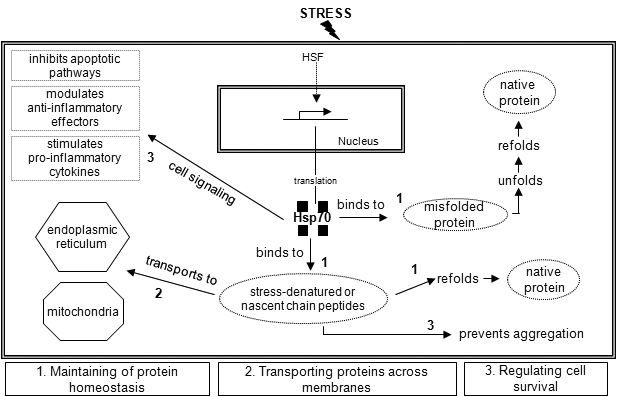Evolutionary.biochemistry of cellular stress response

heat shock.response
Our current focus is Hsp70 proteins. These proteins are involved in many cellular processes and are essential for cell survival. Although their functions inside the cell have been extensively studied, their recently discovered functions outside of the cell remain largely undefined. Several studies have correlated the presence of extracellular Hsp70s to the activation of the immune system and many human diseases like cancer. Our group aims to characterize these new properties of the Hsp70s. We are using bioinformatics, molecular biology, and biochemistry to identify the physiological role of the extracellular Hsp70s. In addition, we aim to investigate whether Hsp70 proteins from the same species (paralogs) and Hsp70s in different species (orthologs) have similar or distinct functions at the cellular membrane and outside of the cell.
Evolutionary relationships of Hsp70 proteins from mice and humans

The major intracellular functions of Hsp70 proteins (figure modified from Haak and Kregel 2008)
Comparative.immunology
Our research on comparative genomics of the immune system aims to elucidate the origin and evolution of the immune system in vertebrates. Elucidating the evolution of the immune system will allow us to understand the immunological defects occurring in human populations. By discovering how the system originated and what changes it underwent in the ancestors of the human species, it will be possible to grasp why the system fails in some individuals. By understanding the reasons for the failure, it will be possible to come up with procedures aimed to correct the failures. Our computational analyses also aim to identify specific proteins or protein complexes that played an important role in the evolution of the immune system during major evolutionary transitions, e.g., humans-primates, mammals-birds, fishes-tetrapods and design experiments to test their function.
Functional differentiation of alpha defensin proteins from human and marmoset (figure modified from Das et al. 2010)

The chicken leukocyte receptor complex contains many chicken immunoglobulin receptor (CHIR) encoding genes (figure modified from Nikolaidis et al. 2005)